What Are AI Coding Tools?
AI coding tools are software solutions that integrate artificial intelligence to assist in various aspects of programming and software development. These tools leverage AI technologies like natural language processing (NLP) and large language models (LLMs) to enhance and augment the capabilities of human programmers.
One of the primary features of AI coding tools is automated code generation and suggestion. These tools can understand the context of code as it is written, and provide real-time suggestions, helping programmers code faster. This is especially useful for repetitive or boilerplate code, where AI can significantly reduce the time and effort involved. Modern AI coding tools can also generate new, working code based on natural language prompts.
SI coding tools can also help with bug detection and code analysis. They can scan through code to identify potential errors, vulnerabilities, or areas for optimization. Unlike traditional static code analysis tools, AI-powered tools can understand the context and intent of the code and review it much like a human would, identifying issues and providing best practices.
AI coding tools can also assist in refactoring and improving the quality of the code. They can suggest better ways to structure code or identify parts of the codebase that could benefit from optimization. This leads to cleaner, more maintainable, and efficient codebases, which are crucial for long-term project sustainability.
This is part of a series of articles about AI tools for developers
Benefits of AI Coding Tools
Increased Developer Productivity
Developers spend a significant amount of time on repetitive tasks such as writing boilerplate code, setting up environments, and debugging. AI coding tools can automate these tasks, freeing up time for creativity and problem-solving.
Not only do these tools reduce manual labor, but they also provide instant feedback and suggestions. For instance, they can recommend code snippets as you type, saving you the effort of recalling or looking up syntax.
Moreover, AI coding tools can handle high-level tasks such as project planning and architecture design. For example, some tools can generate a complete project structure based on your specifications. This means you can start coding right away without worrying about the foundational work.
Improved Code Quality
AI coding tools can minimize coding errors by providing real-time syntax checking and error detection. They can also help enforce coding standards and best practices. For example, these tools can automatically format code, check for code smells, and recommend refactoring where necessary. This results in clean, readable, and maintainable code.
AI tools can also automate the code review process by scanning the code for potential issues and suggesting improvements. They can check for things like code complexity, duplication, potential bugs, and deviation from standards, providing a comprehensive review in a fraction of the time it would take a human.
The same applies to debugging. AI tools can identify bugs in your code, pinpoint their location, and even suggest fixes. This smart debugging reduces the time needed to sift through lines of code and speeds up the development process.
Enhanced Code Optimization and Performance
Optimizing code involves tweaking it to make it run faster, consume less memory, or meet other performance criteria. This is a complex task that requires a deep understanding of the code and the underlying system.
AI tools can analyze your code and suggest optimizations based on patterns they’ve learned from other optimized codes. They can point out inefficient algorithms, unnecessary computations, and other performance bottlenecks, and suggest more efficient alternatives.
Related content: Read our guide to AI code review
Types of AI Coding Tools
Here are the main types of AI coding tools:
- Automatic code generation: Automatic code generation tools leverage AI to generate code based on your specifications. You simply describe what you want the code to do, and the tool generates the corresponding code. This can range from simple functions to complete applications.
- Code completion and assistants: Code completion tools assist you as you code by suggesting code snippets, auto-completing code lines, and providing real-time syntax checking and error detection. They are often referred to as a virtual pair-programmer, guiding you through the coding process.
- Code review: AI-powered code review tools scan your code for potential issues such as bugs, security vulnerabilities, code smells, and deviation from coding standards, and suggest improvements. This speeds up the code review process and improves coverage.
- Documentation generators: AI-powered documentation helpers ease the burden by generating documentation based on your code. They analyze your code, identify its key elements and their relationships, and produce documentation automatically. They can also update documentation automatically as you modify your code, making it easier to maintain documentation.
Related content: Read our guide to AI code generation
10 Notable AI Coding Tools
Automatic Code Generation Tools
1. GitHub Copilot

GitHub Copilot is an AI-powered code generation tool designed to enhance the productivity of developers. Developed by GitHub in collaboration with OpenAI, it uses context from the code being written to suggest entire lines or blocks of code. This tool is trained on a vast corpus of public source code, making it adept at understanding and generating code in multiple programming languages and styles.
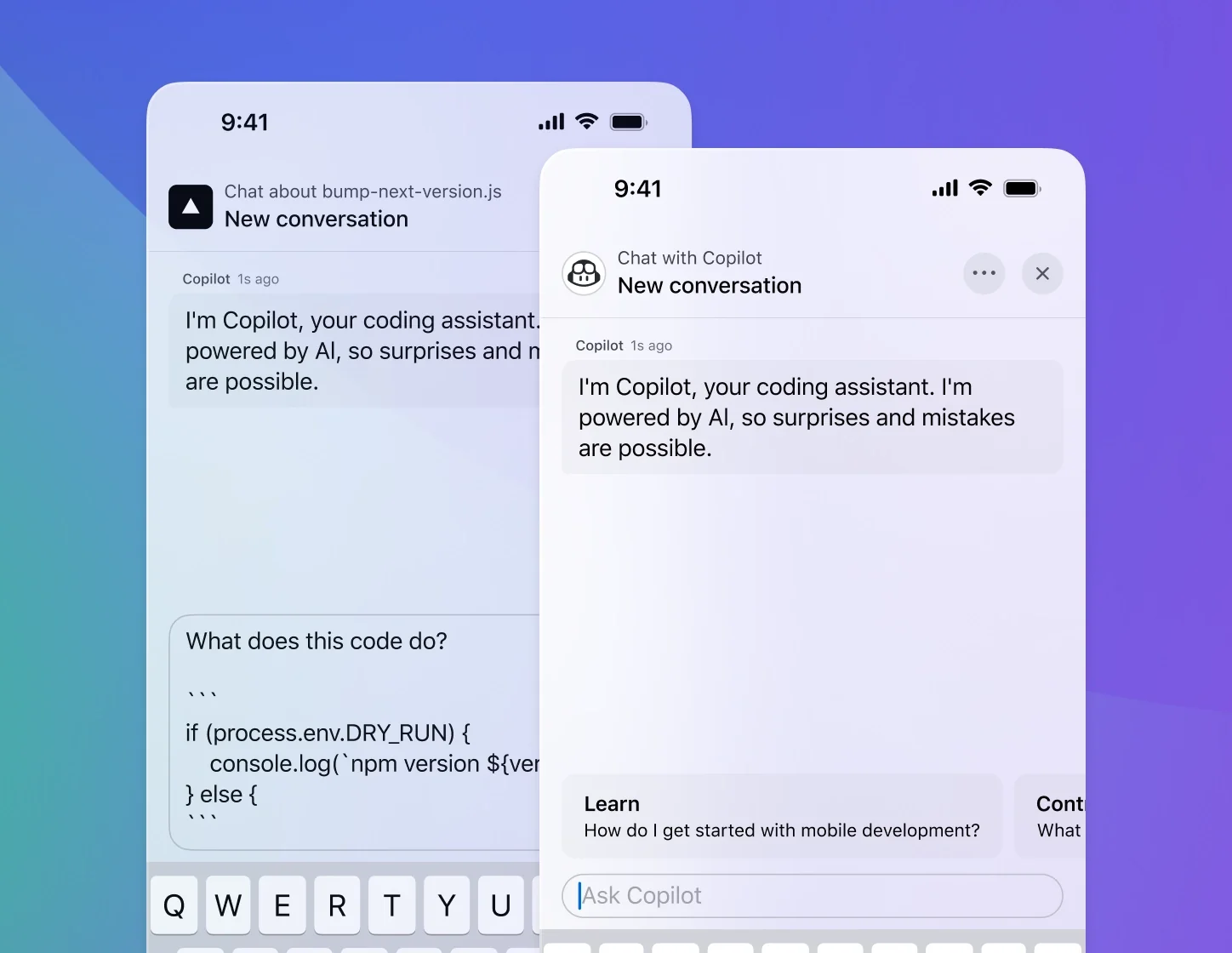
Source: GitHub
Copilot integrates seamlessly with Visual Studio Code, Visual Studio, Vim, Neovim, JetBrains, and Azure Data Studio. It offers suggestions that developers can accept, modify, or reject. It can also write test cases and code comments, making it a versatile assistant in the software development process.
2. Amazon CodeWhisperer
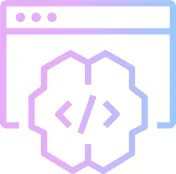
Amazon CodeWhisperer, developed by AWS, is an AI-driven coding assistant designed to help write code more efficiently. It provides code recommendations based on the context of the project and the code being written. CodeWhisperer supports multiple programming languages and frameworks and is integrated into popular Integrated Development Environments (IDEs) like AWS Cloud9, Visual Studio Code, and IntelliJ IDEA.

Source: Amazon
CodeWhisperer can generate code snippets, understand and write in response to natural language comments, and assist in detecting and refactoring code. Additionally, it incorporates security and best practices in its suggestions, offering a balanced mix of productivity and code quality.
3. OpenAI ChatGPT

OpenAI’s ChatGPT is the world’s most popular AI chatbot. At the time of this writing its free version uses GPT-3.5, and its paid version offers GPT4-Turbo, probably the most powerful Large Language Model (LLM) available today. GPT-3.5 and 4 are language models that generate human-like text and code based on natural language prompts. While not specifically trained on code, it can write code snippets, explain code, debug, and offer programming solutions.
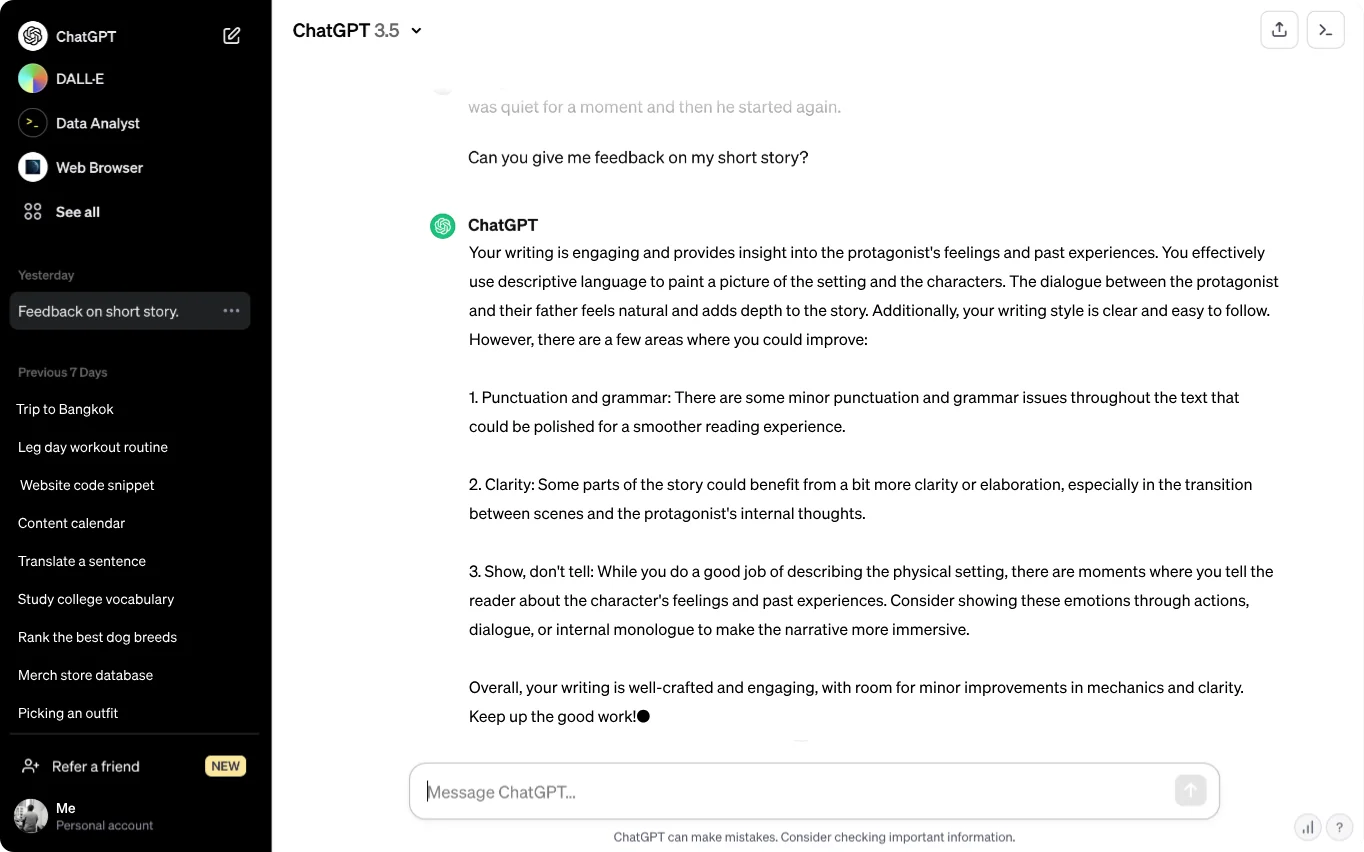
Source: OpenAI
ChatGPT’s strength lies in understanding natural language, making it accessible for non-experts seeking to understand coding concepts or needing help with straightforward coding tasks. Its versatility makes it useful for a range of applications beyond coding, including content creation, conversation, and language translation. However, in comparison to dedicated code generation tools, it can be more prone to generating code that is incorrect or does not follow best practices.
Code Understanding Tools
4. Swimm

Swimm is an AI coding assistant that helps developers understand big, complex codebases. Additionally, Swimm enables engineering organizations to seamlessly capture knowledge in order to fill in any documentation gaps.
Swimm is particularly beneficial for development teams aiming to streamline knowledge management, improve code comprehension, and reduce onboarding time for new developers. It supports major Git hosting providers and integrates into development environments like VS Code and JetBrains.
5. DeepCode

DeepCode AI, powering the Snyk platform, is an AI-powered code review tool that specializes in analyzing codebases for security flaws and potential bugs. It employs machine learning and symbolic AI to process extensive data from open-source software projects, learning to identify serious coding issues effectively.
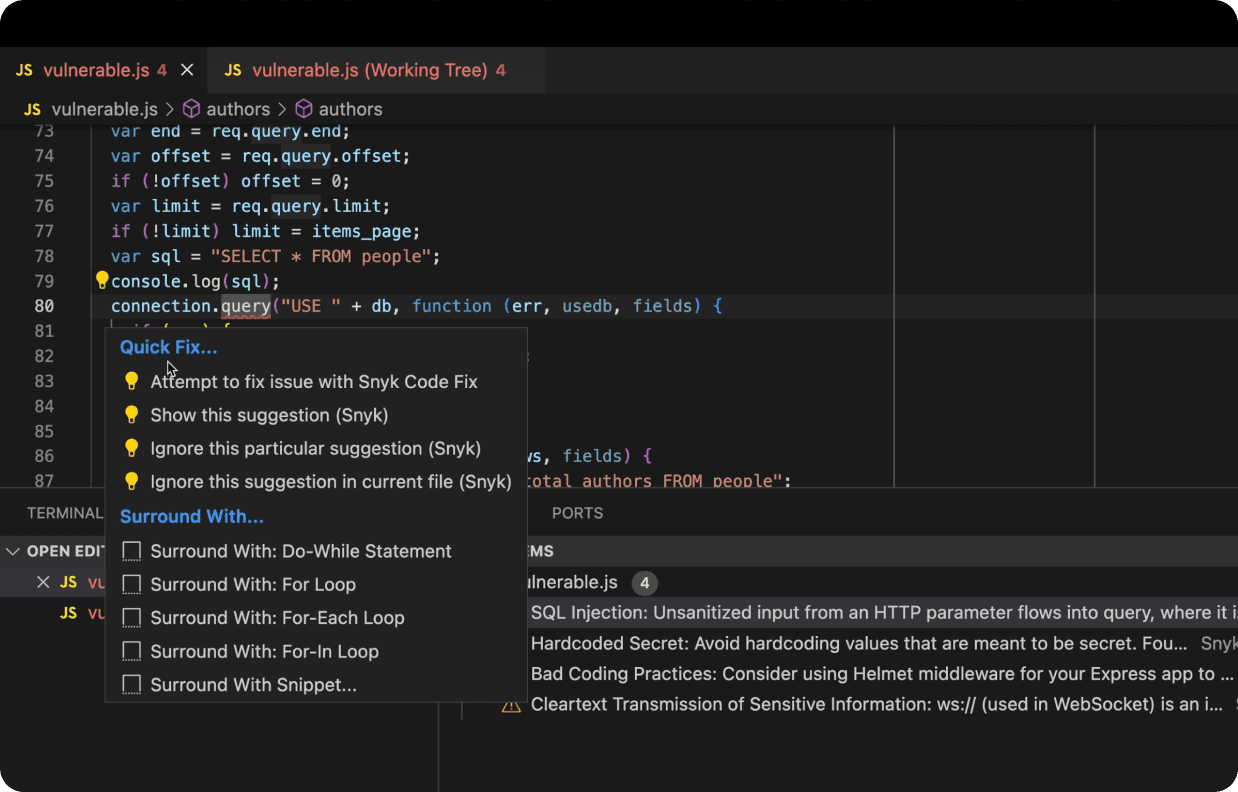
Source: Snyk
DeepCode AI stands out for its focus on security, utilizing multiple AI models trained specifically on security data and curated by top security researchers. This approach results in high scanning accuracy and developer-friendly tools that assist in identifying and fixing security vulnerabilities and code quality issues. Unlike traditional static analysis tools, DeepCode AI does not rely on manually hardcoded rules but learns these automatically using machine learning techniques.
6. Codacy

Codacy is an AI-powered DevOps intelligence platform that automates code reviews and monitors code quality with each commit and pull request. It supports a vast array of programming languages and frameworks, making it highly versatile. Codacy AI runs atop Codacy’s analysis engine, offering actionable suggestions for resolving issues, automating fixes, and enabling one-click issue resolution.
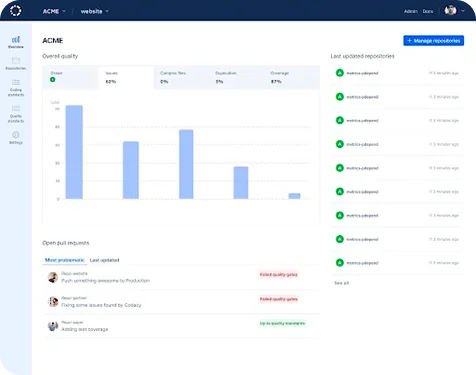
Source: Codacy
The platform excels in tracking changes in code coverage, code duplication, and code complexity, thereby ensuring consistent code quality. Codacy provides a centralized hub for issue resolution within the Git provider, streamlining the process for developers and teams.
7. CodeGuru

Amazon CodeGuru is a service comprising two tools: CodeGuru Reviewer and CodeGuru Profiler. The Reviewer is a bug scanner used during code reviews, providing automated recommendations to help developers identify defects and deviations from best coding practices. It particularly excels in flagging potential security vulnerabilities, such as SQL injection and cross-site request forgery.
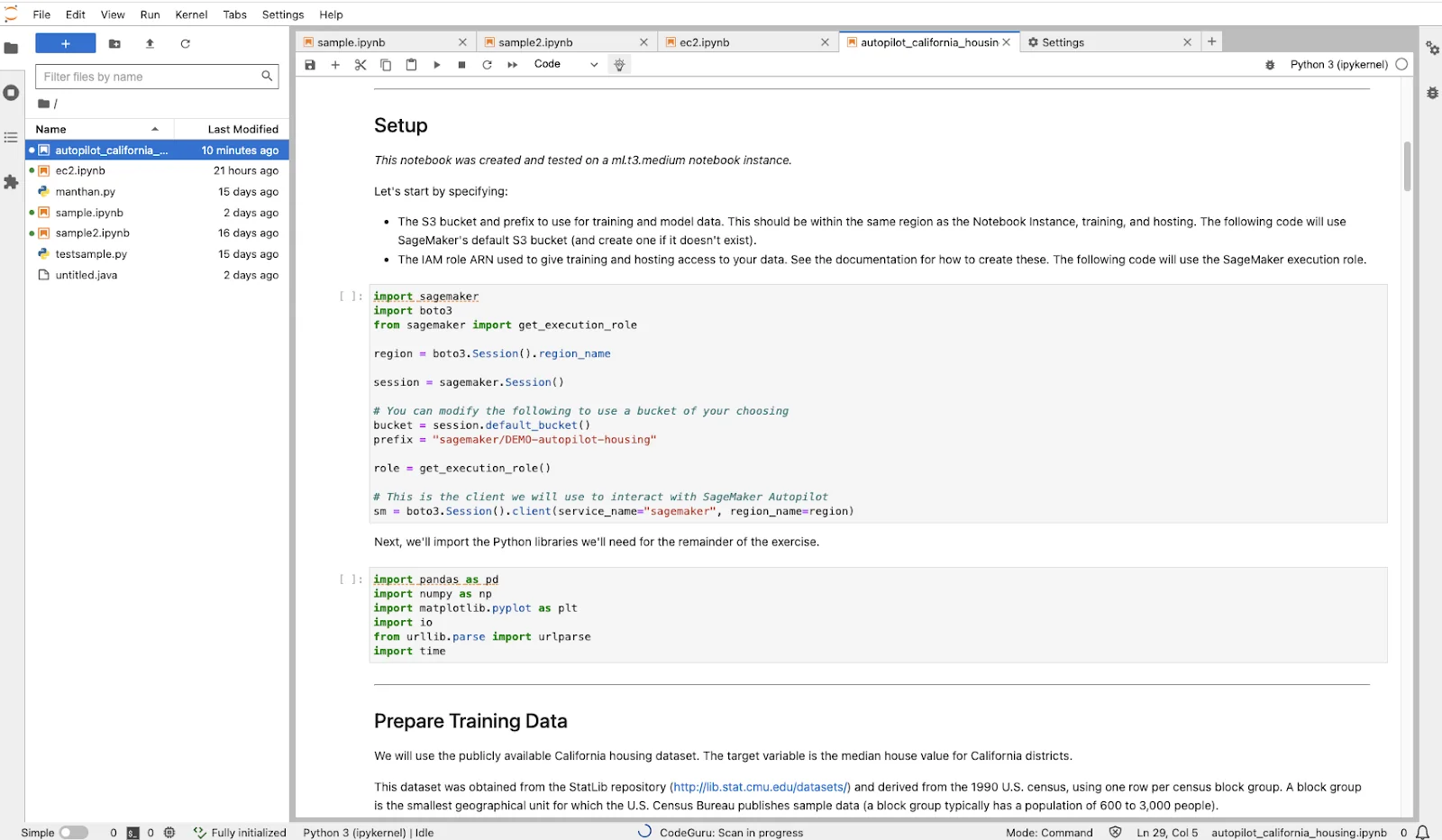
Source: AWS
The Profiler, on the other hand, identifies the most CPU-intensive lines of code in production applications, suggesting improvements to optimize performance. CodeGuru utilizes machine learning and automated reasoning, combining them with static application security testing (SAST) to identify vulnerabilities and offer recommendations for their resolution.
Code Completion & Assistant Tools
8. Replit Ghostwriter

Replit Ghostwriter is a feature within the Replit online coding platform, designed to enhance coding efficiency. It provides real-time code suggestions as developers write code in the Replit IDE. This AI-powered tool supports multiple programming languages and offers context-aware code completions, helping to speed up the coding process and reduce errors.
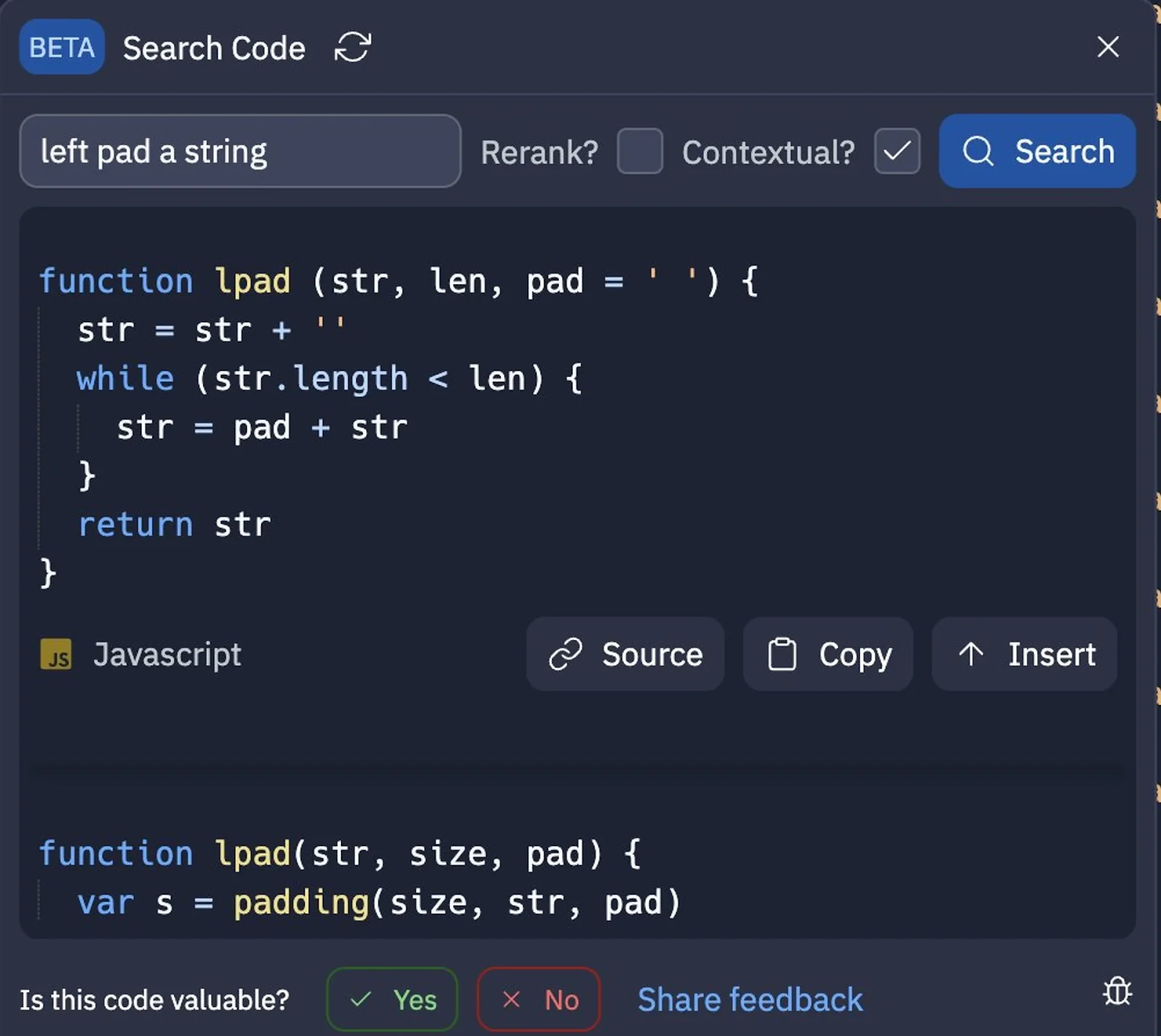
Source: Replit
Ghostwriter can generate code snippets, complete partially written code, and even suggest alternative approaches to problem-solving. It’s particularly useful for educational purposes and for beginners learning to code, as it offers a user-friendly interface and immediate feedback.
9. Tabnine

Tabnine is an AI-powered code completion tool that aims to boost developer productivity by providing intelligent code suggestions. It integrates with a wide range of IDEs and supports over 20 programming languages. Tabnine’s suggestions are based on the context of the code, learning from the coding style and patterns of the user.
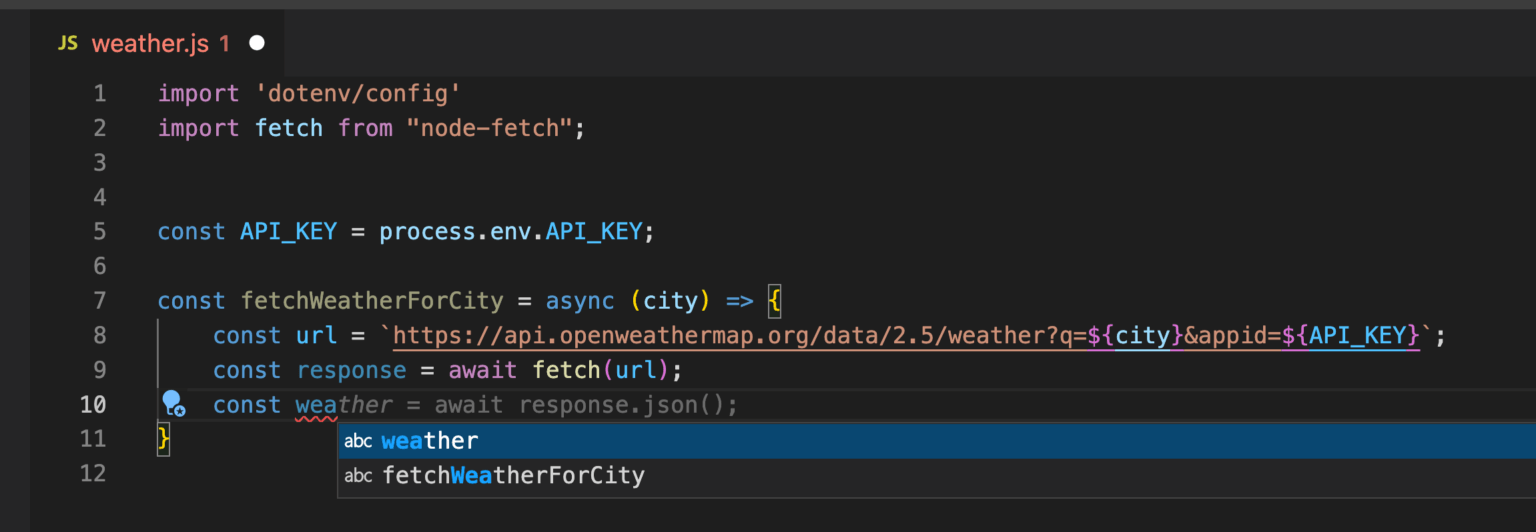
Source: Tabnine
Tabnine can suggest entire lines or blocks of code, helping to reduce repetitive coding tasks and improve coding speed. It offers a proprietary large language model (LLM) trained on secure open source libraries using permissive licenses, making it more appropriate to enterprise environments. It also offers the option to train its model on a company’s specific code base, and host the model on-premises.
10. CodeComplete

CodeComplete is an AI code assistant designed primarily for enterprise use. It provides AI-powered code recommendations, auto-completion, and error detection capabilities, which contribute to improved code quality and more efficient development workflows.
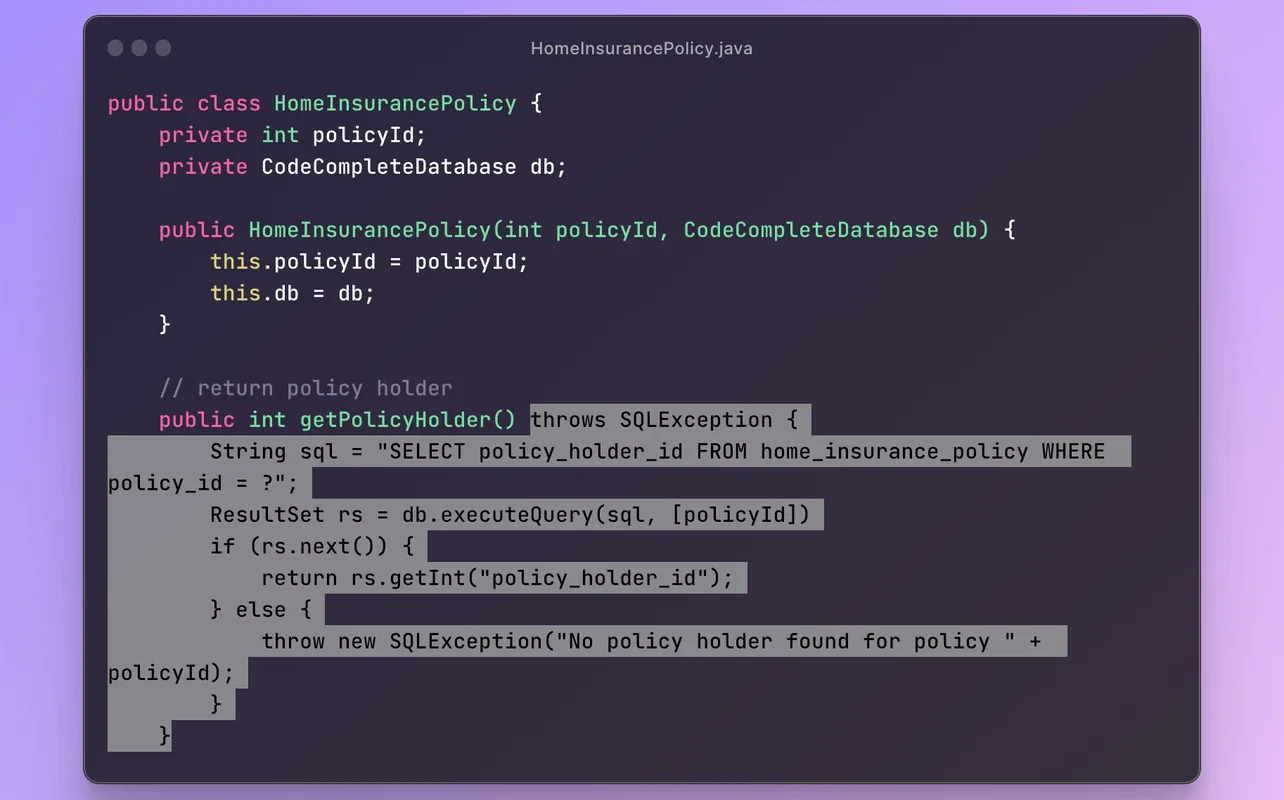
Source: CodeComplete
Like Tabnine, it provides the ability to self-host and fine-tune based on a company’s specific codebase and coding style, ensuring a high level of customization and security. This self-hosted approach enhances data security and intellectual property protection, crucial for enterprise environments.
Conclusion
AI coding tools represent a pivotal advancement in software development. They harness artificial intelligence to streamline various aspects of programming, enhancing efficiency, code quality, and overall developer experience.
The key capabilities of AI coding tools include automated code generation, real-time code suggestions, bug detection, code analysis, and refactoring recommendations. These features address a wide range of challenges faced by developers, from writing repetitive code to optimizing complex codebases for performance and maintainability.
Improved developer productivity is a significant benefit. By automating routine tasks, providing instant feedback, and handling high-level tasks like project planning, these tools free developers to focus on creative and complex problem-solving aspects of their work. The result is a more efficient development process, allowing for quicker project turnaround times.
Improving code quality is another crucial advantage. AI coding tools offer real-time syntax checking, error detection, and adherence to coding standards. This leads to cleaner, more readable, and maintainable code, reducing the likelihood of bugs and simplifying future enhancements or modifications.
Finally, some tools specialize in code understanding, helping development teams onboard new developers and easily get up to speed on new codebases. They can also auto-generate documentation and code explanations to facilitate knowledge sharing.
Check out Swimm to see how it can improve code understanding in your organization